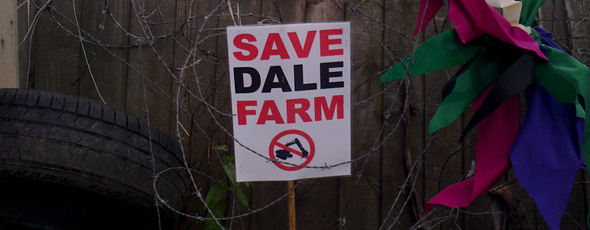
A year has passed since the violent eviction of Dale Farm, a Traveller site in Essex. The eviction cost £4.8m, resulted in 35 arrests and left 80 families homeless. On the anniversary of the eviction, the OT speaks to some of those whose lives have been changed by the challenges they face.
The eviction of Dale Farm was the culmination of 10 years of legal twisting and turning. Candy Sheridan, vice chair of the Gypsy Council, describes the negotiation process leading up to the eviction as extremely confusing and deceiving, saying in a pensive tone “I think they were running circles around us”. Finally, in the early autumn of 2011, authorities were ready to put an end to Dale Farm.
Ellen Yianni, an activist who lived on the site for a month, describes how residents prepared for an increasingly likely eviction: “I arrived late in the evening, the night before the first big potential eviction attempt on September 19,” Ellen explains. “The site was buzzing with late night preparations. Until the early hours of the morning, I helped to build barricades and coordinated with the other medics, the numbers of which were woefully insufficient. Some of the residents were having celebrations, celebrating the 10 happy years they’d spent at Dale Farm.” A month later, bulldozers and hundreds of policemen in riot gear appeared on site to forcefully remove the Travellers from their plots.
The eviction itself is frequently described by those who were present as “horrific”. Although it was expected and meticulously planned for, it was nonetheless shocking and extremely traumatic. “I remember the police coming through the back fences, facing my caravan where my kids were and my kids looking at them,” recalls a former Dale Farm resident. “It’s absolutely been a nightmare.”
Ellen offers a similar observation: “I was struck by the image of two hundred coppers with riot shields glinting, marching towards us. It was a very violating feeling. The next few hours were a mixture of violence, crying children in their parents’ arms, desperately scrabbling around the site to avoid batons and a heavy, sinking anxiety hanging in the air.” Over the course of a day the close-knit community was destroyed, their once-lively plots were filled with stagnant water, and sewage soaked into ground that had been gardens.
A year later, around 36 families have moved onto Oak Lane, the road leading to their former home. They have no access to electricity or running water and have to share one toilet between 40 people. The once thriving community now resembles a toxic wasteland, where children play among the debris, rats, and ruins of what used to be their home.
What many of the residents lament most of all is that prior to the eviction, for the first time in generations, the children of Travellers had been able to settle into a school and had learned to read and write. “Why would they give them an education and then take it away?” asked one of the mothers.
Basildon Council is now taking measures to remove the families residing along Oak Lane. According to councillor Tony Ball, “the council will be checking compliance after September 29. If the notices have not been complied with, then we will have to go through the correct processes to determine the appropriate course of action.” Though the specifics of the operation remain unclear, the council does not exclude any of its options. “I said last year that there was no need for people to be living on the roadside,” Ball continued “and that they should engage with the council regarding personal needs.”
Nathan Saunders, an activist from the Traveller Solidarity Network (TSN), disagrees with the claim that the residents could simply relocate: “What has been offered is a couple of flats. These are not only insufficient in relation to the number of people living on the roadside, but expecting Travellers to move into council flats is a gross disregard of their human rights as warranted by the UN Convention.” One of those living on Oak Lane echoed this sentiment, stating that “If we had anywhere else to go we would be gone”. Many within the Traveller community feel that the extreme and disproportionate measures taken by the council are an expression of a deep intolerance towards the Gypsy/Traveller culture.
Travellers are not the only ones being subjected to an ultimatum. The Traveller Solidarity Network has given the Department for Communities and Local Government 28 days to vacate their central London premises, citing “persistent racially aggravated persecution [of Travellers, Gypsies and Roma]… harassment, alarm, and distress amounting to anti-social behaviour and gross misconduct.” The government department, led by Conservative Eric Pickles and responsible for much-criticised changes to Traveller site provision in the recent Localism Act, refused to comment. TSN insist they have completed a full ‘Equalities Impact Assessment’ which “balanced the needs of Eric Pickles’s political career against the rights of Travelling communities to a home” and warned that if the ultimatum is not observed, “direct action will commence no later than 1pm on the October 19.”
For more information: www.travellersolidarity.org/









